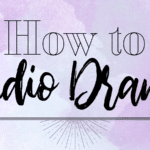A Beginner’s Guide to the Internet for Podcasters

You’ve got your podcast equipment equipment. You’ve written a script or an outline of your show. You’ve recorded, edited, and re-edited your first episode. You’ve even picked a catchy theme song. Now it’s time to sit back, relax, and watch the downloads tally up.
But wait, where are the listeners?
We can’t just expect our listeners to find us without getting out there and pushing the podcast. I produce two podcasts and there is a substantial work we have had to do to get the word out about our shows. The most vital – and most obvious – thing a podcaster can do is have a strong web presence. Through websites, social media handles, newsletters, and blogs, you can reach listeners who would have never found you otherwise. But how do you know what’s right for your podcast? Here’s a breakdown of tips that can help you grow your podcast exponentially.
Don’t Be Scared
Even if you believe you aren’t a tech wiz, you can master the art of social media. You just have to remember that if social media is a game and the goal is to win, this means gaining a following. This guide can help you gain the tools you need to thrive in the digital age, without sacrificing your artistic voice or talent.
One more note: this guide contains tips and ideas for quite a number of platforms. We do not expect you to be on every social media platform. So try not to feel overwhelmed when reading through.
Engaging Your Audience
The goal of this guide and using social media in general is to build followers for your podcast brand and engage them. The more people you engage, the more people listen to your show.
However, people are busy and there is a lot of content in the world. To engage followers, you have to put out content that is captivating, funny, raw, etc. Some of the best ways to engage followers are to ask questions. This gives your followers something to interact with and shows that you care about their voice in the community – whatever platform that may be.
80/20 Rule
Using social media is great for getting the word out about your podcast. But if all you’re doing is posting your show link again and again, nothing is going to happen. That’s not how you get listeners and that’s not how you should be using social media to engage with the podcast world.
Through interactions on social media, you can get to know your fans on a deeper level than through redundant marketing. And that level of personal connection is something no paid promotion can buy you. It’s an emotional connection. Use social media to communicate with your listeners — your community. Respond to their tweets and their emails. Ask for their opinions. That close tie will make them your fiercest advocates.
Basically, use the 80/20 rule. 80% of the content you put out on your platforms should be about the community or other things going on in the world, and 20% of the content should be directly related to you. For example, for my literary podcast – the Dead Rabbits Podcast – we regularly post about other presses, the lit community and ask our fans what they’re reading – while posting about our own activities only once in a while. This rule will help you keep your community at the center of your online presence.
Your Podcast Brand
Branding is one of those buzz-words that can turn off creatives, but essentially, your brand is your promise to the listener. It’s the words, images, and emotional resonance that people associate with r your name or your podcast.
Brand is the public’s perception of you. It’s your personality, every word you write, the fonts and colors you use, the way you make people feel when they listen to your show or visit your website. Many people wrongly equate brand merely to logos or website colors and although these are brand elements, a brand is much more than just these graphic aspects and symbols. Basically, a brand is how other people describe you when you’re not in the room.
Serious podcasters who want to succeed should include branding in their early planning. A strong brand helps a podcast in the same way it helps a company. It gives you name recognition and helps you sell your product—your podcast.
Website
It is crucial to your podcast brand that you have a website that is visually stunning, interactive, and engaging. If you already have one, great! If you need to update it, then do it. And if you don’t have a website at all, there are many, many templates out there that make creating one easy. The Dead Rabbits Podcast is hosted on Squarespace – more specifically, under a tab on our general Dead Rabbits press site – but Wix, Webpress, and even WordPress have easy to navigate platforms. To be clear, I’m suggesting strongly that you don’t just use your podcast hosting platform – like Podbean or Buzzsprout – as your website. Most listeners don’t listen on those platforms, they listen on iTunes, Spotify, Google Play, Stitcher… the list is long. While the platform you host your podcast on is good for many reasons, it won’t showcase your brand like a personal website will.
Blogging
Engaging blog posts are a great way to connect with fans and give listeners another reason to visit your site. Writing a blog is your chance to connect with your audience on a deeper level, beyond the word- and attention-span-limits set by traditional social media. Use your blog as a platform to share what’s happening in your show and to give insights into your creative process, your personal rituals, and what inspires you. This is the type of content fans expect to find on podcast sites and the reason they visit.
As with a podcast episode, there is no set rule on the length of a blog post, but on average posts range from 350 to 1,500 words. Look for blogs that already have the readers you’re trying to attract, since those blogs have succeeded at what you’re trying to do. And also look for other bloggers who are at the same point in their growth as you are – like those within the Discover Pods community! These peers will grow along with you, creating a great marketing network.
Newsletters
Just like blog posts, newsletters are a great way to connect with fans and give listeners another reason to visit your site and your episodes. Writing a monthly newsletter brings your work directly into your readers’ inboxes.
There are many free platforms that are great for sending out newsletters, like MailChimp and TinyLetter. Play around and find one that fits your needs. Start by subscribing your friends and family to your newsletter, then put a button on your website where new readers can subscribe to it.
And don’t just make the newsletter all about you. Similar to the 80/20 rule surrounding social media posts, if you want more and more people to read your work, you’ll need to give as much as you take. Start by drawing attention to other people in the podcast community – like other podcasts and hosts you admire.
Need ideas? Check out Dead Rabbits monthly newsletter. You can subscribe to it on our website: deadrabbitsbooks.com
Visuals
Be sure to include striking visuals on your social platforms and website, which will draw significantly more people to your content. Even taking pictures of what you’re recording – guests in front of microphones, field work, books related to the topics you’re discussing – and posting them to your social handles will prompt more people to engage with you. Just don’t forget to use strategic hashtags (see hashtags below).
We love to hate it, but Facebook is an excellent platform through which to gain followers. If you don’t have a personal page already, get one. Even if you don’t post often, you can still connect with old friends, family, and acquaintances who will listen to your episodes as they come out.
Any time you go to an event, especially a podcast related one, remember the people you met and friend them on Facebook the next day. Facebook has the largest audience of any social media site. That’s a lot of potential listeners, but also a lot of noise that potential listeners need to drown out in order to find you. Try joining different Facebook Groups to help gain friends and fans (keep reading).
Facebook Groups
If you do have Facebook, you might consider starting a group and joining a few others. Other groups to join, in addition to making your own are:
- #PodernFamily
- Podcast Brunch Club
- Podcast Growth Mastermind
- Podcasts We Listen To
- Podcasts NYC
- She Podcasts
- Bloggers Supporting Each Other
- Grow Your Blog
- Podcast Community
- Podcasters’ Hangout
Being a part of these communities can help you make connections and find followers for your work.
Twitter is a great platform for podcasters to find a wide audience. It’s important to post regularly on Twitter, at intervals throughout the day. Links to blog posts, inspirational quotes, and short audio clips with images make great posts. Random thoughts and questions can sometimes perform well on Twitter, but keep them related to your podcast (in terms of topics and interest, not just stuff from your actual podcast), if that’s what your account is supposed to be about.
Use hashtags. 1 to 3 per post is the general recommendation. Don’t miss out by omitting tags altogether, as they help significantly with reach. While using the podcast hashtags, like #podcast #podcasts and #podernfamily, can help connect you with other podcasters, it won’t exactly help you find listeners who are interested in the subject matter your show tackles. Use hashtags related to your podcast’s theme. For instance, for Dead Rabbits (again, a literary podcast), we use #writingcommunity, #writercommunity, #writetip, #whyIwrite, #amwriting, and #writerslife often to get in touch with our audience. For my other podcast, the feminist podcast Rosé All Day Anyways, we use hashtags like #womensupportingwomen, #wine, #girlpower, and the occasional #bachelornation hashtag when we’re watching…
Instagram is perfect for catching your listeners’ attention and gaining followers, especially if you take great photos. It has one of the highest engagement rates out there and with hashtags like #podernfamily, it’s easy to find like-minded people.
For instagram, follow people you know and people who follow you. Don’t follow random people on Instagram expecting them to follow you back. Like Twitter, use hashtags to reach a wider audience. See the hashtag page below for more great content to follow and post to.
Reddit has a reputation for housing trolls, but don’t dismiss it outright! There are tons of great communities where you can connect with other writers, get feedback, and get more followers of your work. If you’re on Reddit, engage as you would in any community. Don’t spam a thread with your content. That’s a quick way to lose Karma. Be an active community member and remember to take as much as you give. Here are some great subreddits to try:
- r/podcast
- r/podcasting
- r/podcasts
- r/podcastsharing
Hashtags
Hashtags are a great way to get more readers and followers on several platforms. Here are some hashtags to explore on different platforms:
- #podernfamily
- #podcast
- #podcasts
- #podcastlove
- #writingcommunity
- #amwriting
- #writerslife
- #MondayMotivation
- #TransformationTuesday
- #Humpday
- #WisdomWednesday
- #WomenCrushWednesday
- #ThrowbackThursday
- #FollowFriday
- #FeatureFriday
- #podcastersofinstagram
- #podcastlife
- #podcasthost
- #podcastaddict
Deciding What’s Right For You
It’s easy to feel overwhelmed after all that. But really, this guide is just an introduction and to help you navigate the world of promotion and engagement. It’s best to focus your time on one or two platforms. The more thinly you spread yourself, the less time you have to spend on each platform, and the harder it is to increase your following.It doesn’t happen all by itself. You’ve got to go put the work in, and it takes time. But if you stick with it, regularly post, update, and engage, you’ll find your following.
Here are some questions to ask yourself before choosing your platforms and trying to figure out the best means of promotion to fit your needs. Think about what you want to project into the world. This will help you figure out what content to put out.
- Who are your listeners? Who is your ideal listener?
- What do people immediately think of when they think of your podcast? This can be a word, an image, etc.
- How do you want others to see you? What do you want people to think when they hear your show name?
- What is your unique selling point? Do you know why people listen to your show? Is it the quality of the writing, your guests, your witty banter? What are your unique strengths?
- How much time do you have to put into social media? If you don’t have much time, concentrate on one platform to grow your following.
Tips + Tricks
Finally, here are some tips and tricks to help you in your journey:
- Don’t just tell the audience you have a new episode, tell them why they should listen. Podcasts aren’t free, it’s an investment of time
- Why should someone take the time & effort to listen to your podcast? This is the question that you need to answer with every tweet, Facebook post, and Instagram image/video that you post. Did you cover a specific topic they may be interested in? Did you bring on a guest that they would be interested in hearing? Each episode that you release should have at least a few “selling points”. Write these selling points down and weave them into the copy of each social media post.
- Be consistent. Don’t just post on a whim or it will be very difficult to reach and engage with a consistent audience.
- Unfortunately, Social Media now moves at such a frantic pace that it’s impossible to keep up. Did you know that, on average, only about 6% of your followers will see a social post on Twitter or Facebook? So make sure to post regularly and more than once about your latest episode.
- Try turning audio clips into short videos to post on your social media handles. You can post those as teasers for your later
- Create Partnerships: One of the best ways to gain exposure and get your content in front of new audiences is by partnering up with other podcasts. The important thing is to make sure that the relationships are mutually beneficial, and that you have something to offer in the partnership as well. Getting featured on other podcasts can be a great way to grow your own audience, even if it is just with a few people at a time. Podcast NY is a great place to start finding other people to work with!
- Build Community: As you grow your audience, at the end of the day you want to be surrounded by a community who supports you rather than a crowd of on-lookers. An engaged community that helps each other will provide a place where others can come for industry-specific help and support when they need it. On top of that, engage with others in your industry to create a strong network for your audience to draw from.
- More Is Better: Sometimes we get caught up in thinking about how often times “less is more”. However, when it comes to social media platforms it is always best to do more! The key is to always show up and be present. Keep your account current to let your followers know that you are working hard to be engaged, and you want to provide them with the best value for filling up their feeds!













Comments
Comments are closed.